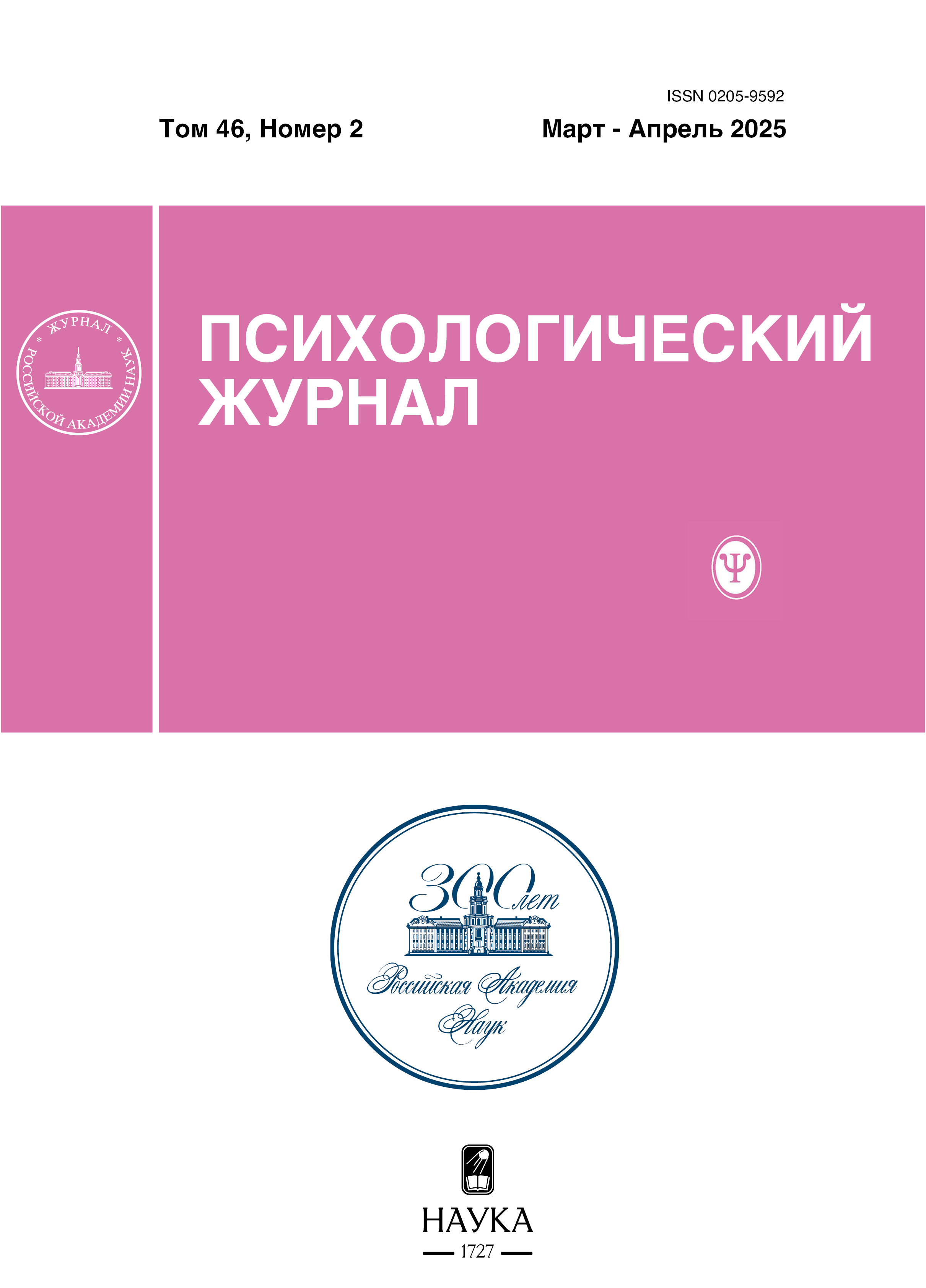“On the bridge” or “on the shore”? The importance of “positionality statement” in inter-paradigm coordination among psychological approaches
- 作者: Nourkova V.V.1,2
-
隶属关系:
- Institute of Psychology, Russian Academy of Sciences
- The Russian Presidential Academy of National Economy and Public Administration (RANEPA)
- 期: 卷 46, 编号 2 (2025)
- 页面: 122-129
- 栏目: Discussion
- URL: https://rjmseer.com/0205-9592/article/view/683557
- DOI: https://doi.org/10.31857/S0205959225020139
- ID: 683557
如何引用文章
详细
The paper is a debatable response to the collective monograph “Scientific Approaches in Modern Domestic Psychology”. The general idea of volume composition and introductory chapter is interpreted as the basis for a novel methodology of systemic inter-paradigm communication and coordination. It is hypothesized that the authors imply a category of subject in their metaphor of “bridges between paradigms” in the sense that this category serves as a potential link between various approaches in contemporary psychology. The article discusses the call for reflection on how a researcher’s personality contributes to scientific activity, both by giving personal meaning to this activity and by structuring the design of a study. This call manifests itself in the form of a “positionality statement”, which is of high relevance due to the organizational diversity of modern psychology. It is contended that the “internal methodology” is a defining feature of a scientist’s personality. Furthermore, the reflection on the author’s methodological attitudes does not serve as an obstacle to inter-paradigmatic dialogue, but rather enhances the ability for scientific empathy. Three variants of inter-paradigmatic interaction are proposed in order to foster the development of distinct research approaches. The “concentration” line of development seeks to maintain the distinctive characteristics across all levels of the methodological framework. This leads to an enhanced replication of the “branded” achievements of the approach in new material. The “generalizing” line of development involves incorporating the achievements of other approaches. These “external” achievements are transferred to “internal” ones in the status of analogues (i.e., having diverse origins but leading to identical consequences). Finally, the line of development, conventionally called “ecumenical”, consists in integrating historically different approaches into broader methodological clusters. These clusters use the unity of general scientific principles and philosophical sources, which leads to their mutual strengthening.
全文:
作者简介
V. Nourkova
Institute of Psychology, Russian Academy of Sciences; The Russian Presidential Academy of National Economy and Public Administration (RANEPA)
编辑信件的主要联系方式.
Email: nourkovavv@ipran.ru
Sc.D. (psychology), professor of RAS, Head of the Laboratory of Personality Psychology of Institute of Psychology of RAS, Leading Researcher of the School of Anthropology of the Future at RANEPA
俄罗斯联邦, 129366, Moscow, Yaroslavskaya str., 13, bldn. 1; 119606, Moscow, Vernadskogo pr., 84 bldn. 1参考
- Asmolov A.G. Po tu storonu soznanija: metodologicheskie problemy neklassicheskoj psihologii. Moscow: Smysl, 2002.
- Bondarev A.P. Zamysel i voploshhenie. Vestnik Moskovskogo gosudarstvennogo lingvisticheskogo universiteta. Gumanitarnye nauki. 2015. № 23(734). P. 7–37.
- Volkov S.M. Dialogi s Brodskim. Moscow: JeKSMO, 2012.
- Vygotskij L.S. Psihologija i uchenie o lokalizacii psihicheskih funkcij. Sobr. soch.: In 6 vv. V. 1. Moscow: Pedagogika, 1982. P. 168–174.
- Vygotskij L.S. Orudie i znak v razvitii rebenka. Sobr. soch.: In 6 vv. V. 6. Moscow: Pedagogika, 1984. P. 6–86.
- Zhuravlev A.L., Sergienko E.A. Sovremennye podhody v otechestvennoj psihologii: edinstvo v raznoobrazii. Psikhologicheskii zhurnal. 2024. V. 45. № 4. P. 114–128.
- Lakatos I. Fal’sifikacija i metodologija nauchno-issledovatel’skih programm. Moscow, 1995.
- Leont’ev A.N. Lekcii po obshhej psihologii. Eds. D.A. Leont’ev, E.E. Sokolova Moscow: Smysl, 2001.
- Mazilov V.A. Integracija nauchnogo znanija v psihologii. Teorija i metodologija psihologii: Postneklassicheskaja perspektiva. Eds. A.L. Zhuravlev, A.V. Jurevich. Moscow: Izd-vo “Institut psihologii RAN”, 2007. P. 427–458.
- Merton R.K. Social’naja teorija i social’naja struktura. Moscow: “Ast”, 2006.
- Nauchnye podhody v sovremennoj otechestvennoj psihologii. Eds. A.L. Zhuravlev, E.A. Sergienko, G.A. Vilenskaja. Moscow: Izd-vo “Institut psihologii RAN”, 2023.
- Nurkova V.V. Jevoljucionnyj povorot kul’turno-istoricheskoj psihologii i teorija kognitivnyh gadzhetov: analogi ili gomologi? Voprosy psihologii. 2019. № 4. P. 29–40.
- Nurkova V.V. Jempatija-otozhdestvlenie i Jempatija-modelirovanie: o kul’turnom konstruirovanii dvuh modusov sovmestnoj dejatel’nosti. Voprosy psihologii. 2020. V. 66. № 3. P. 3–13.
- Perlov A.M. Chetyre ustanovki v teorii gumanitarnogo issledovanija: Pozitivizm. Intuitivizm. Spekuljativizm. Kriticheskaja ustanovka. Moscow, 2018.
- Rubinshtejn S.L. Osnovy obshhej psihologii: In 2 vv. V. 1. Moscow: Pedagogika, 1989.
- Sergienko E.A. Mezhparadigmal’nye mosty. Psihologicheskie issledovanija. 2016. V. 9. № 48. P. 4.
- Smirnov S.D. Metodologicheskij pljuralizm i predmet psihologii. Voprosy psihologii. 2005. № 4. P. 3–8.
- Stjopin B.C. Samorazvivajushhiesja sistemy i postneklassicheskaja racional’nost’. Voprosy filosofii. 2003. № 8. P. 5–17.
- Tihomirov O.K. Psihologija myshlenija. Moscow, 1984.
- Fejerabend P. Protiv metoda. Ocherk anarhistskoj teorii poznanija. Fejerabend P. Izbrannye trudy po metodologii nauki. Moscow, 1986. P. 125–465.
- Judin Je.G. Sistemnyj podhod i princip dejatel’nosti: metodologicheskie problemy sovremennoj nauki. Moscow, 1978.
- Roberts S.O. Dealing with Diversity in Psychology: Science and Ideology. Perspectives on Psychological Science. 2024. V. 19. № 3. P. 590–601.
补充文件









